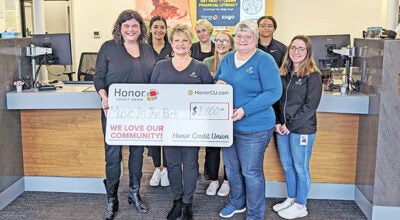United Way discusses food security at Rotary
Published 8:00 am Friday, January 15, 2016
A good education and a stable living environment are but two parts of the formula to ensure that children stay on track for a successful future.
Another critical piece — one that often gets overlooked — is making sure that students have consistent access to healthy and nutritious food.
For many working parents in Cass County, this is not something they can easily provide to their children, which a problem that officials with the United Way of Southwest Michigan are looking to fix.
Representatives with the area nonprofit organization discussed their work to address hunger in Cass County households during Thursday’s meeting of the Dowagiac Rotary Club at the local Elks Lodge. Rachel Wade, the vice president of impact and development, and Doug Ferrall, director of programs and evaluation, shared the data they have assembled about the problem in the county and asked for suggestions from Rotarians in attendance about possible solutions.
Consistent access to healthy food items, commonly referred to food security, has been a topic the United Way has been interested in for quite some time, Wade said. Much of their focus has been to solve these problems not just in households that live below the poverty line, but for so-called ALICE (Asset Limited, Income Constrained, Employed) families, Wade said.
“ALICE is that bucket of people who earn more than the poverty level, but not enough to meet the basic level of living,” Wade said. “They make too much to qualify for assistance programs but not enough to be financially stable on their own.”
In a study conducted by Rutgers University on behalf of the Michigan Association of United Ways, 39 percent of the population of Cass County lives below the ALICE threshold. In the Dowagiac zip code alone, 27 percent of households live below this level, Wade said.
The focus on these particular households is important for the United Way because, while many families living below the poverty line know and have access to food assistance programs, many of these ALICE households do not, Wade said.
Keeping children well fed is of particular importance, as studies have shown that students who have food security have higher academic performance numbers and have better social development, among other factors, Wade said.
“Even little bits of food insecurity can have tremendous impacts on young children,” she said.
After sharing these numbers with the audience, Ferrall asked the club about the observations they have made in regards to hunger and how it affects the local community. Rotarian and Dowagiac Attorney Mark Herman talked about how, through his work with juveniles, he has seen how children are directly impacted by a lack of food in their households.
“Sometimes, you think those food insecurities maybe lead people to some of those other issues,” Herman said. “They’re getting into drugs, or they’re physically abusive, because their parents are strained economically and those things are taken out on kids.”






